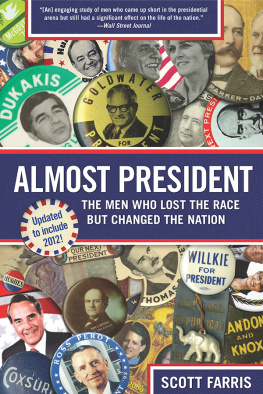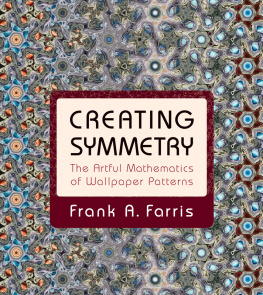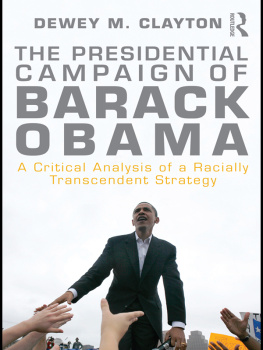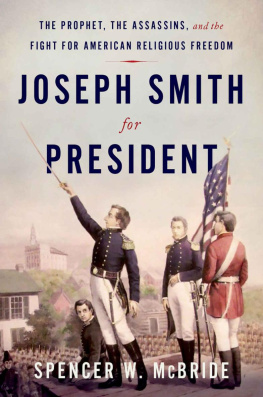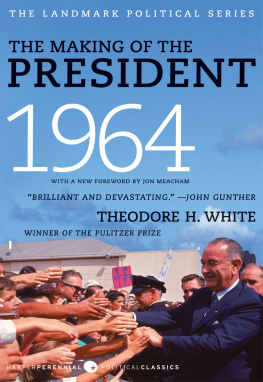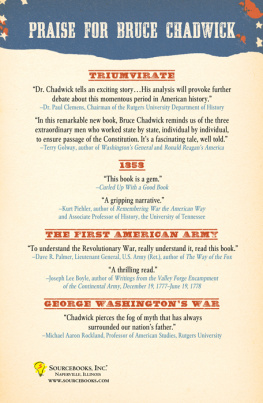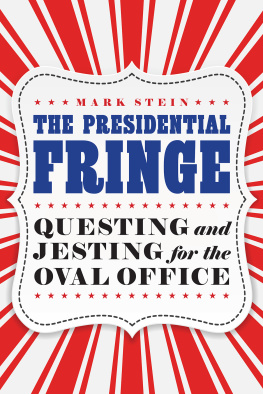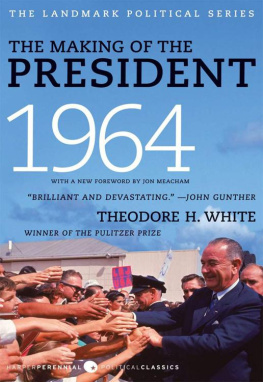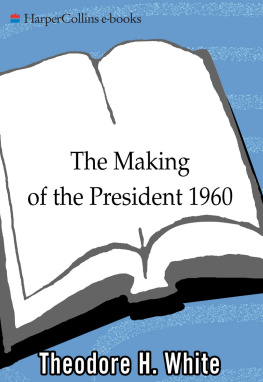ALMOST PRESIDENT
THE MEN WHO LOST THE RACE
BUT CHANGED THE NATION
SCOTT FARRIS

LYONS PRESS
GUILFORD, CONNECTICUT
An imprint of Globe Pequot Press
For my marvelous and loving family: Patti, William, and Grace
Copyright 2012 by Scott Farris
ALL RIGHTS RESERVED. No part of this book may be reproduced or transmitted in any form by any means, electronic or mechanical, including photocopying and recording, or by any information storage and retrieval system, except as may be expressly permitted in writing from the publisher. Requests for permission should be addressed to Globe Pequot Press, Attn: Rights and Permissions Department, P.O. Box 480, Guilford, CT 06437.
Lyons Press is an imprint of Globe Pequot Press.
Ross Perot photo courtesy U.S. Dept. of Veteran Affairs; Al Gore official VP photo; John Kerry and John McCain photos courtesy U.S. Congress; all other photos courtesy the U.S. Library of Congress.
Text design: Sheryl Kober
Layout artist: Justin Marciano
Project editor: Ellen Urban
Library of Congress Cataloging-in-Publication Data
Farris, Scott.
Almost president : the men who lost the race but changed the nation / Scott Farris.
p. cm.
Includes bibliographical references and index.
ISBN 978-0-7627-6378-8
1. Presidential candidatesUnited StatesBiography. 2. PresidentsUnited
StatesElectionHistory. 3. United StatesPolitics and government. 4. United StatesBiography. I. Title.
E176.F23 2012
324.973dc23
EISBN 978-0-7627-8420-2
Printed in the United States of America
CONTENTS
INTRODUCTION
In very rural northwest Kansas, midway between Kansas City and Denver, there is a shrine of sorts dedicated to losing presidential candidates. On a wall of the First State Bank in the wind-swept prairie town of Norton hang the portraits of fifty-nine men who have run for president as the nominee of a major political party and lost. The line of photos and short biographies begins with Thomas Jefferson, who became our nations first losing presidential candidate in 1796, and endsas of this writingwith John McCain, the 2008 also-ran with his loss to Barack Obama. The display began in the 1960s, after the then-president of the bank learned that Horace Greeley, the losing presidential candidate of 1872, had once stopped in Norton on his way by stagecoach to Denver and was likely the most prominent person ever to visit the small farming and ranching community.
How appropriate that the only place in America dedicated to honoring losing presidential candidates was established in such an out-of-the-way location and for such an obscure reason, for historical obscurity is generally the lot of those who run for president and lose. Names like Lewis Cass, Horatio Seymour, Winfield Scott Hancock, James G. Blaine, Alton B. Parker, or John W. Davis are unknown to all but the most obsessed political junkies. Even the better-known unsuccessful aspirants to the White House, such as Henry Clay, William Jennings Bryan, Thomas Dewey, or Adlai Stevenson, are not fully appreciated for how they changed American politics and how their candidacies continue to shape our political discourse.
These men actually have had a far greater impact on American history than many of those who became president. They created, transformed, and realigned our political parties. They broke barriers and taboos around religion and gender, ushered in new political movements, introduced sweeping policy changes that would, in time, become the law of the land, and changed our expectations of political candidates. Journalist Theodore White, chronicler of five presidential campaigns, agreed: Again and again in American history it has happened that the losers of the presidency contributed almost as much to the permanent tone and dialogue of politics as did the winners.
They were able to accomplish these things, in part, because they lost. How can losing have more impact than winning? As American political scientist William Riker noted in 1983, Winners have won and do not immediately need to change things. But losers have nothing and gain nothing unless they continue to try to bring about new political situations.
In the immediate aftermath of an election, it may appear there is nothing left of the losing campaign but scattered debris. Reshaping our political structure can be like remodeling a housesalvaged from the demolition is the framework on which to hang new construction. Those who lose, especially those who lose by a wide margin, are often accused of discrediting conservatism or liberalism, as was the case with Barry Goldwater and George McGovern, when years or decades later it is clear that their campaigns were not the end of something old and stale, but the beginning of something fresh and different.
Still, despite the enormous contributions made by some losing presidential candidates, it is the winning candidates who are lavished with attention by historians. Abraham Lincoln, our most revered president, has had more than sixteen thousand books and scholarly articles written about him. Even nonconsequential presidents such as William Henry Harrison, James Garfield, and Chester Arthur are the subjects of multiple biographies, while a historical giant like Henry Clay has, in times past, gone fifty years without a scholarly reappraisal. And poor Judge Parker, who lost to Theodore Roosevelt in a landslide in 1904, has never been the subject of a single biography.
History is written by and for the victors, true, but to ignore the contributions made by losing presidential candidates is to not merely ignore half the result of every presidential election, but also to warp our understanding of American history. No election is a referendum on a single person or party. In each election, voters make a choice between competing personalities, programs, and ideologies. In understanding our history, and in using history as a guide to understanding the present and forecasting the future, it is as illuminating to know who and what voters did not choose as to know who and what they did choose.
It seems understandable not to dwell on perceived failure. Even though losing is a universally shared experience (most of us lose far more often than we win), we are a nation and a culture that simply worships winning and recent success. We are guided by maxims, such as that (falsely) ascribed to Green Bay Packers football coach Vince Lombardi, Winning isnt everything, its the only thing. But winning is a narrow definition of success. A presidential campaign is a single battle in a much longer war over the policies and direction of the nation.
Like the scientific process, political struggles test hypotheses. Policies rejected by the public today often become the laws and regulations of tomorrow. New voter coalitions that seem to doom a political party to minority status evolve, sometimes quickly, sometimes slowly, into new governing majorities. It is often the losing candidate who is prophetic, while time proves it was the winning candidate who was stuck in the policies of the past.
Yet, in America a single lost election can seemingly wipe out a lifetime of achievement overnight and transform the image of an otherwise successful politician from gallant champion to pathetic goat. As we do with great athletes whose otherwise exemplary careers are overshadowed by a single, crucial error in a championship game, we often define losing presidential candidates not by their substantive accomplishments before, during, and after their campaigns, but by their failure on this one great stage of a presidential election.
Next page
